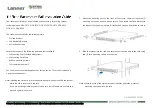
Copyright CES 1998 Page 2 11/17/98
VAD-1 Universal Delay Module
Installation Instructions
GENERAL DESCRIPTION
The VAD-1 provides a programmable audio delay from 2ms to 1 second. Selection of the delay time is achieved through solder
bridges or may occur serially. (The VAD-8 also available from CES provides a delay of up to 8 seconds).
INSTALLATION
Installation and programming of this CES product must be completed by a qualified two-way radio technician or engineer. CES
is not responsible for any operational problems caused by system design, outside interference, or improper installation. Observe
static prevention techniques.
Before Installing
The VAD-1 may be installed in almost any transmitter/receiver. The module should be programmed prior to performing the
actual installation.
Input Level Adjustment
The Input audio level can be adjusted by turning R18 to increase or decrease the input audio level. See Figure 2 for component
layout diagram.
Output Level Adjustment
The output audio level can be adjusted by turning R2 to increase or decrease the output audio level. See Figure 2 for component
layout diagram.
Time Delay Selection
Following Table 1 place solder bridges on the specified coding pads. X means solder bridge required, blank means leave
bridge open. See Figure 2 for the location of the solder bridges on the PCB. To control the delay time serially, short J16. For
programmable values not listed in Table 1, please contact CES or your local CES authorized distributor.
Mute Input
A mute input is provided to turn off the audio output. The polarity is programmable using jumper J15. Short J15 for active
High. Default is open, active Low. See Figure 2 for component layout diagram.
Wiring Interface
See Table 2 for wiring details.
Mounting Details
Mount the module to a suitable location in the transceiver, preferably away from high RF and sensitive receiving stages, with
the provided double-sided tape.

























